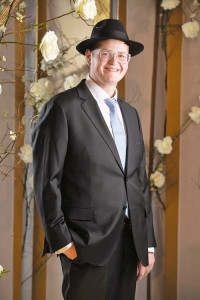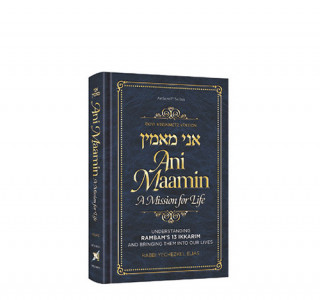
Highlighting: “Ani Maamin: A Mission for Life. Understanding the Rambam’s 13 Ikkarim and Bringing Them Into Our Lives” by Rabbi Yechezkel Elias. ArtScroll/Mesorah Publications. 2022. English. Hardcover. 320 pages. ISBN-13: 978-1422631645.
(Courtesy of Artscroll) The 13 Ikkarei Emunah, the “Ani Maamins,” appear in our siddurim, and many of us recite them every day after tefillah. And yet… do we understand what they mean in our own everyday lives and actions?
In a new thoughtful work, “Ani Maamin: A Mission for Life,” Rabbi Yechezkel Elias examines each of the 13 Ikkarei Emunah. Using contemporary examples that we can all understand and relate to, he makes the often difficult concepts contained in the 13 Ikkarim clear, comprehensible—and very, very relevant. Each ikkar is followed by a section titled “How does this affect my daily life?” which shows us how to put these foundational beliefs into practice in our own lives.

One of the kedoshim of Meron was habachur Dovi Steinmetz, z”l, of Montreal. In the months since last Lag BaOmer, Dovi’s father, Reb Shloimi Steinmetz, has become an ambassador of faith, asking people to recite the 13 Ani Maamins printed in every siddur after davening each morning l’ilui nishmas the pure neshamah of Yissochor Dov Berish ben Reb Shloime.
People have responded…and how! With enthusiasm and passion, eager not just to create zechusim for this extraordinary neshamah but to bring a little more emunah into their own lives, men and women, adults and children, have joined this initiative. Regardless of community, demographic, level of observance or family minhag, emunah lives in the neshamah, and for anyone with a Divine spark, the message resonated.
As part of the initiative, Rabbi Yechezkel Elias gave a series of shiurim on each of the 13 Ikkarei Emunah, which form the basis of this beautifully presented book.
The following is an excerpt from the book on one of the most famous ikkarim, the 12th ikkar.

There Will Come a Day
אֲנִי מַאֲמִין בֶּאֱמוּנָה שְׁלֵמָה בְּבִיאַת הַמָּשִׁיחַ וְאַף עַל פִּי שֶׁיִּתְמַהְמַהּ עִם כָּל זֶה אֲחַכֶּה לּוֹ בְּכָל יוֹם שֶׁיָּבוֹא.
I am steadfast in my absolute belief in the coming of Mashiach, and even though he may delay, nevertheless I await his arrival each day.
Imagine that a new business enterprise is launched, after a huge initial investment. A large workforce is hired, and the business concept promises outstanding potential for growth. A few months later, however, the business seems to have soured. Not only isn’t it thriving, it’s struggling to survive. Most of the employees are apathetic, and many are failing to perform their jobs correctly. Some seem to have forgotten the concept of work altogether, and spend their days at the office drinking coffee, chatting, and playing with their phones. Worse, although all these employees, down to the cleaning crews working the nightshift, receive generous salaries and numerous perks, many of them busy themselves organizing vocal protests to voice their imaginary grievances against the investor backing this entire enterprise. The few truly dedicated employees, who understand the value of their jobs and their responsibility to their employers, labor on with difficulty, struggling to remain productive in a workplace where they are ridiculed for their views and ethics. The investor? He sees the madness, and yet, for some mysterious reason, continues pouring in money to keep the enterprise afloat.
This is an apt analogy to the world we live in.
Hakadosh Baruch Hu created this world of ours with a purpose. He wants something out of this enterprise. Yet what results is He getting? By the numbers, it would seem like a colossal failure. The overwhelming majority of the world’s population does not even subscribe to the basic monotheistic belief that He is the sole source of existence. To put this into perspective, estimates place the world population of declared atheists and agnostics at 70 times greater than the number of Jews in the world. Picture this: For every minyan of Jews who could potentially declare “Shema Yisrael,” a crowd of 700 of Hashem’s creations screams back, “No Creator exists!”
But wait; that number includes only those who categorically deny Hakadosh Baruch Hu’s existence. Billions more believe in various other misguided ideologies, whether polytheism, pantheism, or any mutation thereof. Going further, of the 15 million or so Jews alive today—less than 0.2% of the world’s population—how many adhere on any level to halachah and Torah values? And if we really take this all the way to the top, how many fully observant Jews excel in all areas of Divine service? Are we, the minuscule fraction of the world populace that actually seek to do the job we were hired for, satisfied that our performance is up to par?
The world around us is not merely out of sync with Hakadosh Baruch Hu’s will, it is increasingly belligerent and hostile toward any expression of the true values that should underpin this world’s functioning. A person voicing the Torah view on issues such as morality or sanctity of life risks being tarred as a bigot and extremist. As society trumpets the value system of the day, the ideals we cherish are ridiculed as archaic and out of touch. And Hakadosh Baruch Hu? He keeps feeding us, providing for our needs, and sustaining the entire world, despite its being so overwhelmingly against Him.
For the Jew who knows better, who discerns right from wrong, this has to hurt. If someone slaps your father and you stand by silently, there’s something seriously wrong. You’re the child of the investor who is pouring all that money into the corporation. You know he is keeping all those employees on the payroll, supporting them and their families, and you watch as they sit around lambasting your father. You may not be able to do much, but you can cry.
There will, however, come a day.
On that day, right will be right and wrong will be wrong. On that day, every human being will recognize with astonishing simplicity that there is One Creator Who controls everything. On that day, everyone will realize that all that matters is His will, and the entire world will focus on doing exactly that. The drive for depravity will evaporate, dissipating like smoke in the wind, and the temptations that currently pull us so strongly will be but a relic of history. The idea of a person being drawn to inappropriate material online, sharing a tantalizing bit of gossip about a neighbor, or even carrying on a conversation during chazaras hashatz will seem as utterly ludicrous as bowing down to a cow. Much as we look back with bafflement at the ancients who worshiped idols, wondering how on earth they could have held such beliefs, we will look back at today’s world with utter bewilderment, wondering how we ever could have ever been attracted even slightly to behavior reflecting lack of financial integrity or moral debauchery. Klal Yisrael will be revered, and their rightful status as the chosen nation, the princes of Hakadosh Baruch Hu, will be universally recognized. We will live our Yiddishkeit with the proudest sense of fulfillment, finding meaning and connection in our every action.
This is what the era of Mashiach will be, as Hakadosh Baruch Hu’s enterprise functions in its full beauty.










